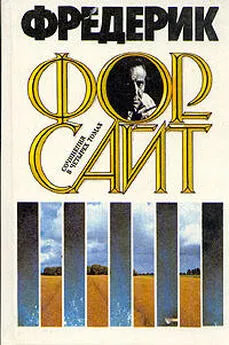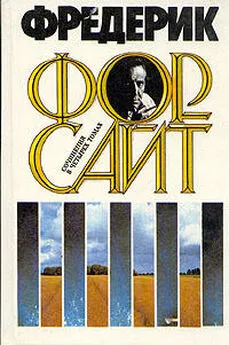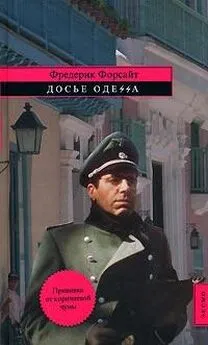Фредерик Форсайт - Нет возврата
- Название:Нет возврата
- Автор:
- Жанр:
- Издательство:Hutchinson
- Год:1982
- Город:London
- ISBN:0-09-147870-7
- Рейтинг:
- Избранное:Добавить в избранное
-
Отзывы:
-
Ваша оценка:
Фредерик Форсайт - Нет возврата краткое содержание
Перед Вами сборник из 10 рассказов, держащих читателя в напряжении, посвященных изменам, шантажу, убийствам и мести, кульминации которых шокируют неожиданными поворотами судеб. На этих страницах оживают персонажи, которых Вы не скоро сможете забыть. Живые люди бесповоротно оказываются в мире, из которого уже нельзя вернуться, если перейти "точку невозврата", перейдя от простого манипулирования покупкой и продажей человеческой жизни к смертельным актам насилия. Содержание:
1. Никаких улик
2. В Ирландии не водятся змеи
3. Император
4. Бывают же дни…
5. Шантаж
6. Used in Evidence - англ.
7. Абсолютная привилегия
8. Долг
9. A Careful Man - англ.
10. В дураках
Нет возврата - читать онлайн бесплатно полную версию (весь текст целиком)
Интервал:
Закладка:
'What was the reason given?' asked Hanley.
'Walked out on him,' said the detective without hesitation. 'No one doubted it. He worked hard, but never wanted to go out in the evening, not even Saturday, hence Mrs Larkin's availability as a baby-sitter. There were rows about it. Something else; she was flighty, a bit of a flirt. When she packed her bags and left him, no one was surprised. Some of the women reckoned he deserved it for not treating her better. No one suspected anything.
'After that, Larkin kept himself even more to himself. Hardly ever went out, ceased to care much for himself or the house. People offered to help out, as they do in small communities, but he rejected all offers. Eventually people left him alone. A couple of years later, he lost his job as a storeman and became a night watchman, leaving after dark and returning at sunrise. Kept the door double-locked at night because he was out, by day because he wanted to sleep. So he said. He also started keeping pets. First ferrets, in a shed in the back garden. But they escaped. Then pigeons, but they flew off or were shot elsewhere. Finally chickens, for the past ten years.'
The parish priest confirmed much of Mrs Moran's recollections. Mrs Larkin had been English, but a Catholic and a churchgoer. She had confessed regularly. Then in August 1963 she had gone off, most people said with a man friend, and Father Byrne had known of no other reason. He would not break the confessional oath, but he would go so far as to say he did not doubt it. He had called at the house several times, but Larkin was not a churchgoer and refused all spiritual comfort. He had called his departed wife a tart.
'It all fits,' mused Hanley. 'She could well have been about to leave him when he found out and went at her a bit too hard. God knows, it's happened enough times.'
The postman had little more to add. He was a local man and used the local bar. Mrs Larkin had liked to have her noggin on a Saturday night, had even helped out as a barmaid one summer, but her husband soon put a stop to that. He recalled she was much younger than Larkin, bright and bubbly, not averse to a bit of flirting.
'Description?' asked Hanley.
'She was short, about five feet three inches. Rather plump, well-rounded anyway. Curling dark hair. Giggled a lot. Plenty of chest. Postman recalled when she pulled a pint of ale from those old-style beer pumps they used to have, it was worth watching. But Larkin went wild when he found out. Came in and pulled her home. She left him, or disappeared soon afterwards.'
Hanley rose and stretched. It was nearly midnight. He clapped a hand on the young detective's shoulder.
'It's late. Get yourself home. Write it all up in the morning.'
Hanley's last visitor of the night was his chief inspector, the scene-of-crime investigator.
'It's clean,' he told Hanley. The last brick removed, and not a sign of anything else that might be helpful.'
'Then it's up to the poor woman's body to tell us the rest of what we want to know,' said Hanley. 'Or Larkin himself.'
'Has he talked yet?' asked the chief inspector.
'Not yet,' said Hanley, 'but he will. They all talk in the end.'
The chief inspector went home. Hanley called his wife and told her he would be spending the night at the station. Just after midnight he went down to the cells. The old man was awake, sitting on the edge of his bunk, staring at the opposite wall. Hanley jerked his head at the police officer with him and they all trooped up to the interview room. The policeman sat in a corner with his notebook at the ready. Hanley faced the old man and read him the caution:
'Herbert James Larkin, you are not obliged to say anything. But anything you say will be taken down and may be used in evidence.'
Then he sat down opposite the old man.
'Fifteen years, Mr Larkin. That's long time to live with a thing like that. August of 1963, wasn't it? The neighbours remember it; the priest remembers it; even the postman remembers it. Now, why don't you tell me about it?'
The old man raised his eyes, held Hanley's gaze for a few seconds, then lowered his eyes to the table. He said nothing. Hanley kept it up almost until dawn. Larkin seemed not to tire, although the policeman in the corner yawned repeatedly. Larkin had been a night watchman for years, Hanley recalled. Probably more awake at night now than during the day.
There was a grey light filtering through the frosted-glass window of the interview room when he rose finally.
'Have it your own way,' he said. 'You may not talk, but your Violet will. Strange that, eh? Talking back from the grave behind the wall, fifteen years later. But she'll talk to the state pathologist, in a few hours now. She'll talk. She'll tell him in his laboratory what happened to her, when it happened, maybe even why it happened. Then we'll come here again, and I'll charge you.'
Slow to anger though he was, he was becoming irritated by the silence of the old man. It was not that he said little; he said absolutely nothing. Just stared back at Hanley with that strange look in his eyes. What was that look, Hanley asked himself. Trepidation? Fear of him, Hanley? Remorse? Mockery? No, not mockery. The man's number was up.
Finally he rose, rubbed a large hand round the stubble on his chin and went back to his office. Larkin went back to the cell.
Hanley snatched three hours' sleep in his chair, head tilted back, feet out, snoring loudly. At eight he rose, went to the rest room and washed and shaved. Two startled young police cadets surprised him there at half past eight as they came on duty and went about their business like two dormice in carpet slippers. At nine he was breakfasted and working his way through a mountain of accumulated paperwork. At 9.30 the contractor's foreman at the Mayo Road job came on the line. Hanley considered his request.
'All right,' he said at last, 'you can fence it in and concrete over.'
Twenty minutes later, Professor McCarthy was on the line.
'I've got the limbs straightened out,' he said cheerfully. 'And the skin is soft enough to take the scalpel. We're draining and drying it off now. I'll begin in an hour.'
'When can you give me a report?' asked Hanley.
'Depends what you mean,' came the voice down the line. 'The official report will take two to three days. Unofficially, I should have something just after lunch. Cause of death at least. We've confirmed the ligature round the neck. It was a stocking, as I suspected yesterday.'
The pathologist agreed to come the mile from the Store Street morgue to Hanley's office by 2.30.
The morning was uninterrupted, save by Major Dawkins, who phoned at midday.
'Bit of luck,' he said. 'Found an old friend of mine in the records office at the War House. He gave me priority.'
'Thank you, Major,' said Hanley. 'I'm taking notes; go ahead.'
'There's not too much, but it confirms what we thought yesterday.'
What you thought yesterday, Hanley said to himself. This laborious English courtesy.
'Trooper Herbert James Larkin arrived on the Dublin ferry at Liverpool, October 1940 and volunteered for the Army. Basic training at Catterick Camp, Yorkshire. Transferred to the King's Dragoon Guards. Sent by troopship to join the regiment in Egypt in March 1941. Then we come to the reason he never made corporal.'
'Which was?'
'He was captured. Taken prisoner by the Germans in Rommel's autumn offensive of that year. Spent the rest of the war as a farm worker at a POW camp in Silesia, eastern end of the Third Reich. Liberated by the Russians, October 1944. Repatriated April 1945, just in time for the end of the war in Europe in May.'
'Anything about his marriage?' asked Hanley.
'Certainly,' said Major Dawkins. 'He was married while a serving soldier, so the Army has that on file, too. Married at St Mary Saviour's Catholic Church, Edmonton, North London, 14th of November 1945. Bride, Violet Mary Smith, hotel chambermaid. She was seventeen at the time. As you know, he got an honourable discharge in January 1946 and stayed on in Edmonton working as a storekeeper until 1954. That's when the Army has its last address for him.'
Hanley thanked Dawkins profusely and hung up. Larkin was thirty-four, turning thirty-five, when he married a young girl of seventeen. She would have been a lively twenty-six when they came to live in Mayo Road, and he a perhaps not so lively forty-three. By the time she died in August 1963, she would have been a still-attractive and possibly sexy thirty-five, while he would have been a perhaps very uninteresting and uninterested fifty-two. Yes, that might have caused problems. He waited with impatience for the visit of Professor McCarthy.
The state pathologist was as good as his word and was seated in the chair facing Hanley by 2.30. He took out his pipe and began leisurely to fill it.
'Can't smoke in the lab,' he apologized. 'Anyway, the smoke covers the formaldehyde. You should appreciate it.'
He puffed contentedly.
'Got what you wanted,' said Professor McCarthy easily. 'Murder beyond a doubt. Manual strangulation with the use of a stocking, causing asphyxiation; coupled with shock. The hyoid bone here' — pointing to the area between chin and Adam's apple — 'was fractured in three places. Prior to death, a blow to the head was administered, causing scalp laceration, but not death. Probably enough to stun the victim and permit the strangulation to take place.'
Hanley leaned back. 'Marvellous,' he said. 'Anything on year of death?'
'Ah,' said the professor, reaching for his attach^ case. 'I have a little present for you.' He reached into the case and produced a polythene bag containing what appeared to be a 6-inch by 4-inch fragment of yellowed and faded newspaper.
'The scalp wound must have bled a bit. To prevent a mess on the carpet, our murderer must have wrapped the area of the scalp wound in newspaper. While he built his oubliette behind the false wall, no doubt. By good fortune it's recognizable as a piece of a daily newspaper, with the date still discernible on it.'
Hanley took the polythene bag and through the transparent material, with the aid of his reading spotlight and magnifying glass, studied the newsprint fragment. Then he sat up sharply.
'Of course, this was an old piece of newspaper,' he said.
'Of course it's old,' said McCarthy.
'It was an old piece, a back number, when it was used to wrap the wound in the head,' insisted Hanley.
McCarthy shrugged.
'You could be right,' he agreed. 'With this kind of mummy, one can't be accurate as to the exact year of death. But reasonably so.'
Hanley relaxed.
'That's what I meant,' he said with relief. 'Larkin must have grabbed the newspaper lining a drawer, or a cupboard, that had been there for years untouched. That's why the date on the paper goes back to March 13th, 1943.'
'So does the corpse,' said McCarthy. 'I put death at between 1941 and 1945. Probably within a few weeks of the date of that piece of newspaper.'
Hanley glared at him, long and hard. 'Mrs Violet Mary Larkin died during August 1963,' he said.
McCarthy stared at him and held the stare while he relit his pipe. 'I think,' he said gently, 'we're talking at cross-purposes.'
'I'm talking about the body in the morgue,' said Hanley.
'So am I,' said McCarthy.
'Larkin and his wife arrived from London in 1954,' said Hanley slowly. 'They bought Number 38, Mayo Road, following the death of the previous owner/occupant. Mrs Larkin was announced as having run away and left her husband in August 1963. Yesterday, we found her body bricked up behind a false wall while the house was being demolished.'
'You didn't tell me how long the Larkins had been at that house,' McCarthy pointed out reasonably. 'You asked me to do a pathological examination of a virtually mummified body. Which I have done.'
Читать дальшеИнтервал:
Закладка:









